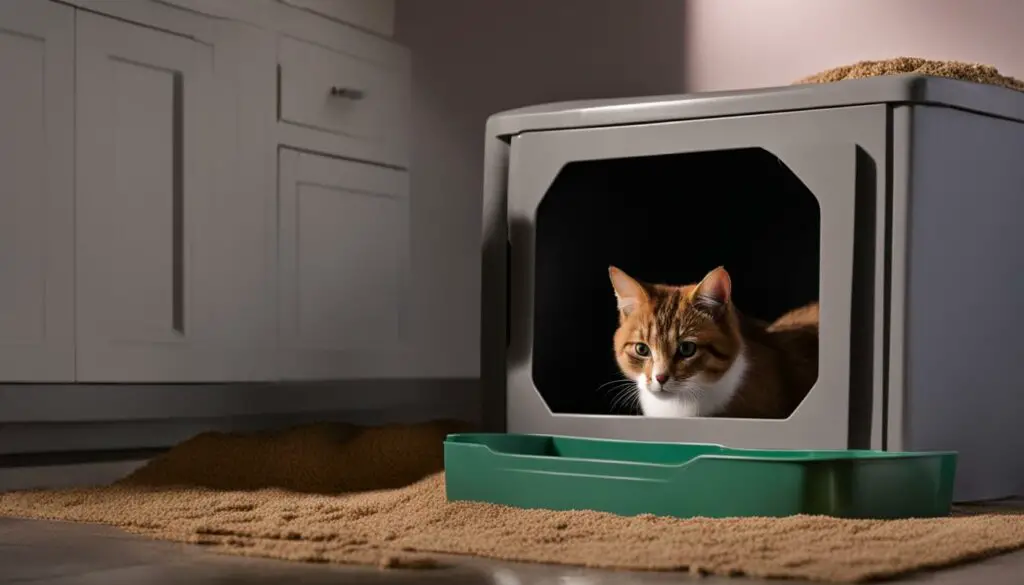If you’ve noticed your male cat making frequent trips to the litter box, you may be wondering what’s going on. This behavior can indicate a urinary issue that requires attention. Whether it’s a medical or psychological cause, understanding why your male cat is exhibiting this behavior is essential for their wellbeing.
Frequent visits to the litter box by a male cat can be a sign of feline lower urinary tract disease. This can be caused by medical or psychological factors, such as stress. It’s important to note that if a cat is repeatedly going to the litter box but not passing urine, this could indicate a blocked bladder, which requires immediate veterinary attention.
Key Takeaways:
- Male cats visiting the litter box frequently may have a urinary issue.
- Frequent visits without passing urine could indicate a blocked bladder.
- Understanding the underlying cause is crucial for proper treatment.
- Medical causes include idiopathic cystitis and bladder stones.
- Psychological causes may be related to stress and changes in the environment.
Medical Causes of Frequent Litter Box Visits
When a male cat frequently visits the litter box, it may be indicative of underlying medical conditions. Understanding these causes can help pet owners identify when veterinary attention is necessary.
One common medical cause is feline idiopathic cystitis, which accounts for about 50% of cases where cats frequently visit the litter box without a clear cause. This condition causes inflammation of the bladder and urinary tract in cats, leading to increased urination and discomfort. Bladder stones are another potential culprit, responsible for approximately 20% of cases. These stones can irritate the bladder, causing the cat to urinate more frequently.
In some cases, male cats may experience urethral blockages, which can result from urinary tract cancer or injury. This blockage prevents the cat from urinating properly and requires immediate veterinary attention. These are less common causes, but it’s important to be aware of them to ensure the health and well-being of your male cat.
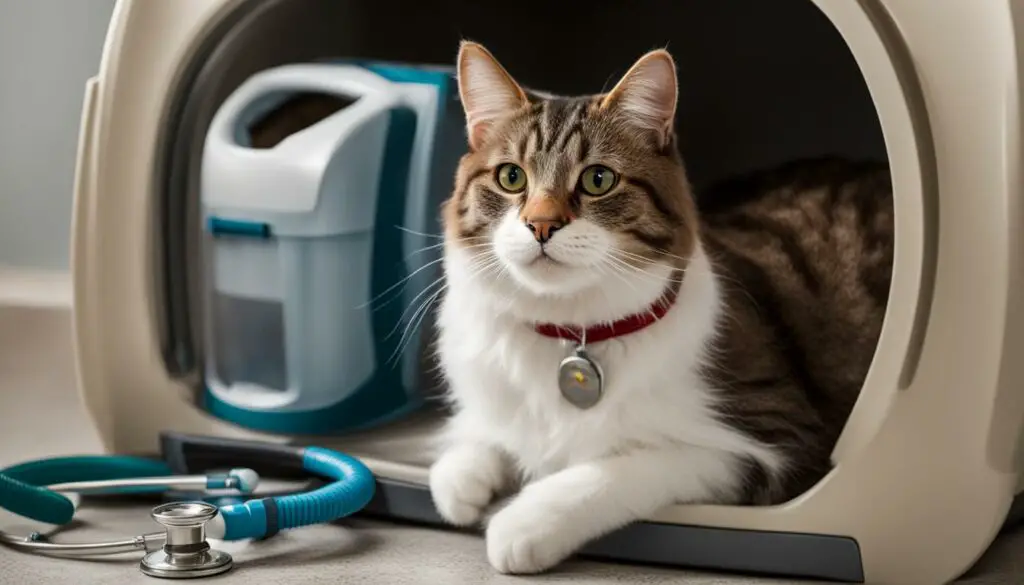
Table: Medical Causes of Frequent Litter Box Visits
| Medical Cause | Percentage of Cases |
|---|---|
| Feline idiopathic cystitis | 50% |
| Bladder stones | 20% |
| Urethral blockages | Less than 5% |
Psychological Causes of Frequent Litter Box Visits
While medical factors can contribute to a male cat’s frequent litter box visits, it’s important to consider the psychological causes as well. Cats are sensitive creatures, and stress can play a significant role in their urinary habits. Stressors such as the presence of another cat, changes in the household environment, or even changes in the weather can trigger stress-related urinary tract issues in cats.
To help reduce stress in cats, there are several strategies you can implement. One effective method is the use of pheromone products like Feliway. These products release calming pheromones that can help cats feel more secure and reduce their stress levels. Additionally, providing a calm and stable environment with plenty of hiding places and vertical spaces can also alleviate stress in cats. These measures can go a long way in preventing inappropriate urination and promoting better urinary health for male cats.
Creating a Stress-Free Environment for Your Cat
When addressing psychological causes of frequent litter box visits, it’s important to focus on creating a stress-free environment for your cat. Here are some tips to help reduce stress in your feline companion:
- Provide a designated safe space where your cat can retreat to when feeling anxious or overwhelmed.
- Create a consistent routine with regular feeding times and play sessions to establish a sense of security and predictability.
- Offer environmental enrichment, such as interactive toys, scratching posts, and perches, to keep your cat mentally stimulated and engaged.
- Introduce changes gradually, giving your cat time to adjust and feel comfortable in their surroundings.
By taking these steps to minimize stress in your cat’s life, you can help prevent stress-related urinary tract issues and support their overall well-being.
| Stress-Reducing Techniques | Benefits |
|---|---|
| Using pheromone products like Feliway | Calms cats and reduces stress levels |
| Providing a designated safe space | Gives cats a place to retreat to when feeling anxious or overwhelmed |
| Establishing a consistent routine | Creates a sense of security and predictability |
| Offering environmental enrichment | Keeps cats mentally stimulated and engaged |
| Introducing changes gradually | Gives cats time to adjust and feel comfortable in their surroundings |
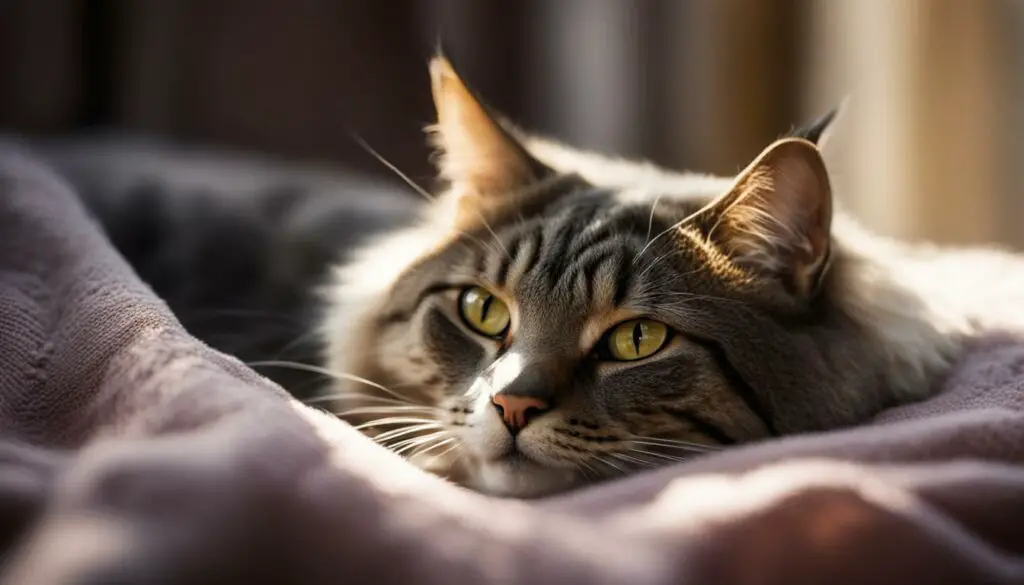
Creating a stress-free environment for your cat is crucial in preventing stress-related urinary issues. By using pheromone products, providing a designated safe space, establishing a consistent routine, offering environmental enrichment, and introducing changes gradually, you can help minimize your cat’s stress levels and promote better urinary health.
Signs to Look Out For in Male Cats
When a male cat frequently visits the litter box, it’s important to observe for signs of urinary issues. These signs can give clues about the underlying cause of the frequent urination and help determine the appropriate course of action. Here are some key signs to look out for:
- Blood in the urine: Hematuria, or blood in the urine, can indicate a urinary tract infection, bladder stones, or even bladder cancer.
- Straining to urinate: If your cat appears to be exerting effort or experiencing discomfort while urinating, it could be a sign of a urinary obstruction or inflammation.
- Urinating in unusual places: If your cat starts urinating outside the litter box, such as on the floor or furniture, it may indicate an underlying urinary issue or behavioral problem.
- Excessive grooming of the genital area: Excessive licking or grooming of the genital area can be a sign of discomfort or irritation caused by a urinary problem.
- Discolored urine: If you notice changes in the color of your cat’s urine, such as it becoming darker or cloudy, it may be an indication of a urinary tract issue.
If you observe any of these signs in your male cat, it is important to consult with a veterinarian. They can conduct a thorough examination and diagnostic tests to determine the cause of the frequent litter box visits and recommend appropriate treatment options.
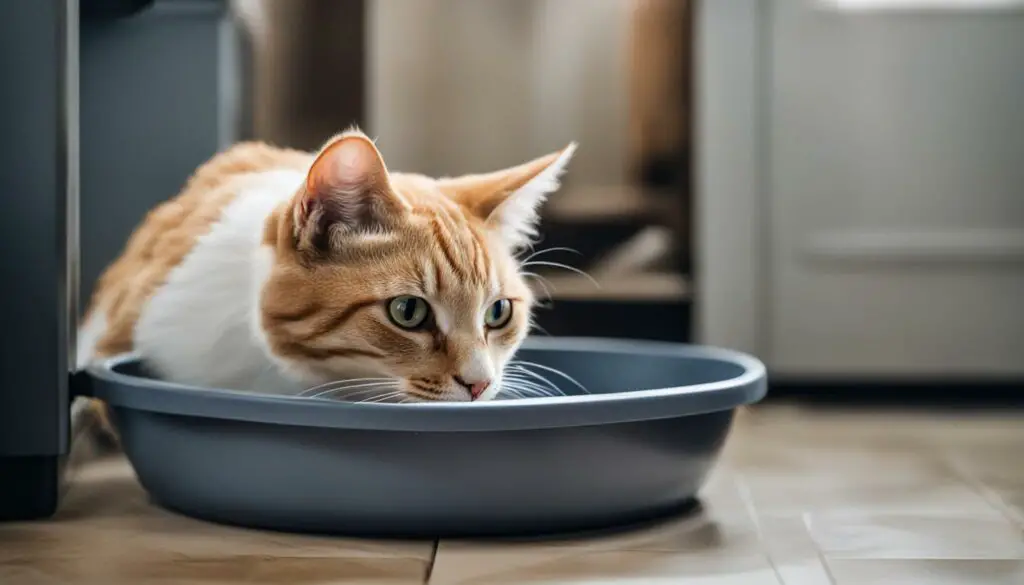
When to Seek Veterinary Attention
If your male cat is frequently visiting the litter box without passing urine, it is essential to seek veterinary attention. This behavior can be a sign of a blocked bladder, which is a medical emergency and requires immediate treatment. Ignoring this sign can be life-threatening for your cat. Other symptoms that warrant a visit to the vet include pain, blood in the urine, and abnormal-smelling urine.
It’s important to remember that male cats are prone to urinary issues, and early detection is key to successful treatment. Regular check-ups with your veterinarian can help monitor your cat’s overall health and catch any urinary issues early on. Your vet can perform examinations and diagnostic tests to determine the underlying cause of your cat’s frequent litter box visits and provide appropriate treatment plans.
By seeking prompt veterinary attention, you can ensure that your male cat receives the necessary care and treatment to manage urinary issues effectively. Veterinarians can offer valuable advice on preventive care, proper nutrition, and stress management techniques, helping to improve your cat’s urinary health and overall well-being.
| Symptoms | Possible Causes |
|---|---|
| Frequent visits to the litter box without passing urine | Blocked bladder, urinary tract infection |
| Painful urination | Bladder stones, urethral blockage |
| Blood in the urine | Urinary tract infection, bladder inflammation |
| Straining to urinate | Blocked bladder, urethral obstruction |
Remember, your male cat’s health and well-being are in your hands. If you notice any concerning symptoms or changes in their litter box habits, don’t hesitate to consult with a veterinarian. They are the best resource for diagnosing and addressing urinary issues in male cats, and their expertise can help ensure a healthier and happier life for your furry friend.
Treatment Options for Male Cats with Urinary Issues
When it comes to treating urinary issues in male cats, the approach will depend on the underlying cause. Here, I will outline some common treatment options that can help improve your cat’s urinary health and alleviate their symptoms.
If the cause of your male cat’s frequent litter box visits is stress-related or idiopathic cystitis, stress reduction techniques can play a significant role in treatment. Environmental enrichment, such as providing hiding places and vertical spaces, can help reduce stress levels. Additionally, using pheromone therapy, such as products like Feliway, can have a calming effect on cats and promote better urinary health.
In cases where medication is necessary, your veterinarian may prescribe drugs to relax the bladder and improve urination. These medications can help alleviate discomfort and reduce the frequency of litter box visits. It’s important to follow your veterinarian’s instructions carefully and ensure that your cat receives the prescribed dosage.
In more severe cases, medical procedures or surgery may be required. This could involve removing bladder stones, addressing urethral blockages, or treating underlying medical conditions. Your veterinarian will determine the appropriate course of action based on your cat’s specific situation and needs.
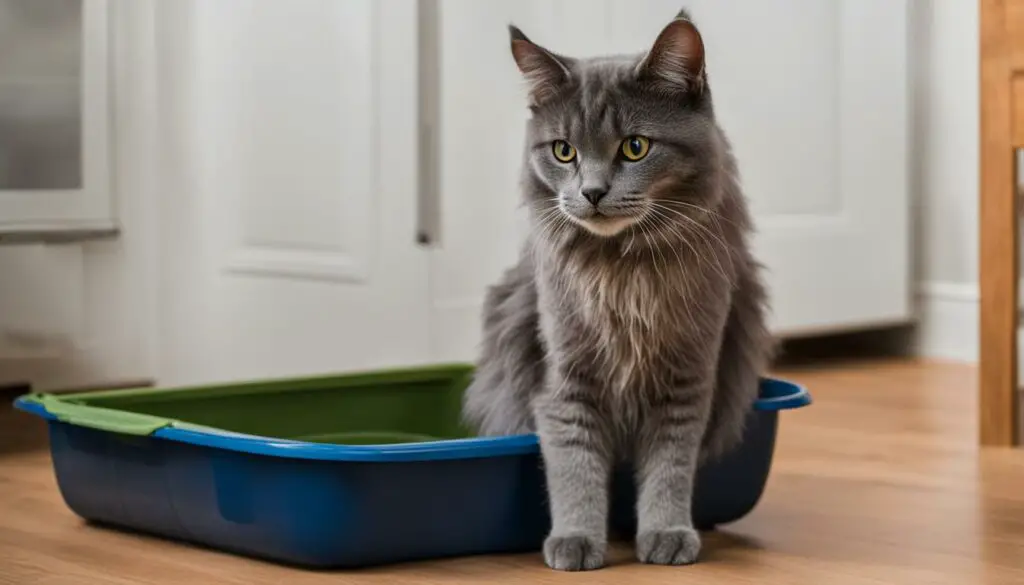
Summary
In summary, treating urinary issues in male cats involves a multi-faceted approach. Stress reduction techniques, medication, and medical procedures are all potential treatment options. It’s important to work closely with your veterinarian to determine the underlying cause of your cat’s urinary issues and develop an appropriate treatment plan. By addressing the root cause and providing appropriate care, you can help improve your male cat’s urinary health and overall well-being.
Litter Box Maintenance and Prevention Tips
Proper litter box maintenance is essential for ensuring the overall health and well-being of your male cat. Here are some important tips to keep in mind:
- Regular cleaning: Scooping the litter box daily is crucial to keep it clean and odor-free. Remove urine clumps and feces promptly to prevent the buildup of bacteria and maintain a pleasant environment for your cat.
- Multiple litter boxes: Provide one more litter box than the number of cats in your household. This helps prevent overcrowding and gives each cat an option when nature calls. Place the litter boxes in quiet and accessible areas, away from high-traffic areas and food/water bowls.
- Appropriate litter depth: The litter should be deep enough for your cat to comfortably dig and cover their waste. Aim for a depth of about 2 to 3 inches to ensure adequate coverage and absorption.
- Litter type and texture: Cats have individual preferences when it comes to litter. Experiment with different types (clumping, non-clumping, scented, unscented) and textures (fine, coarse) to discover what your cat prefers. Avoid sudden changes in litter type, as it may lead to litter box aversion.
- Size and accessibility: Choose litter boxes that are large enough for your cat to move around comfortably. If you have an older or arthritic cat, consider using a litter box with low sides for easy entry and exit.
- Stress reduction: Cats are sensitive creatures, and stress can contribute to litter box issues. Provide a calm and stress-free environment by offering hiding places, vertical spaces, and a consistent routine. Additionally, consider using pheromone products like Feliway to help soothe and relax your cat.
By following these litter box maintenance tips, you can help promote good litter box habits in your male cat and minimize the risk of urinary issues.
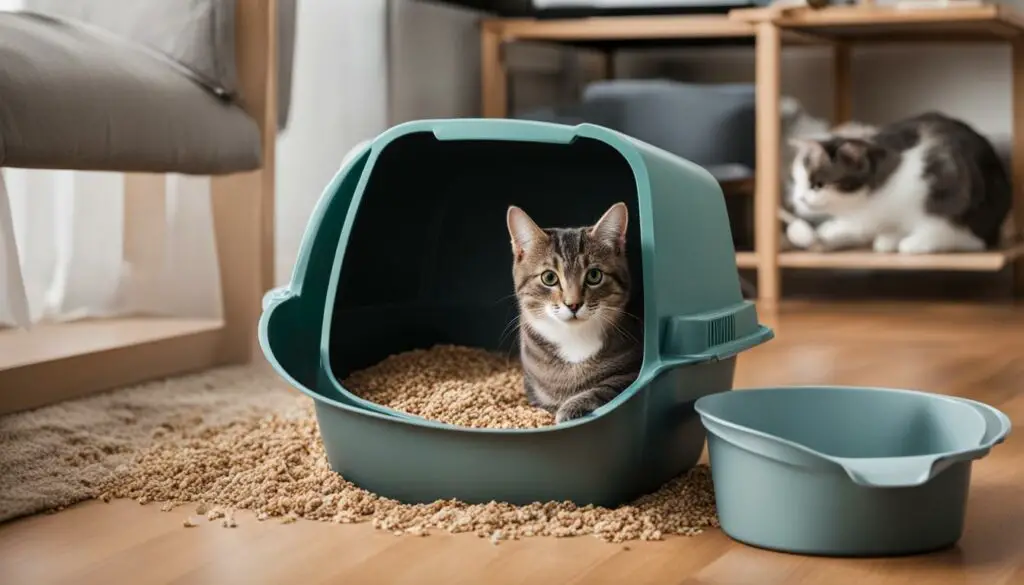
Summary:
Proper litter box maintenance plays a vital role in maintaining your male cat’s health. Regular cleaning, providing multiple litter boxes, using appropriate litter, ensuring the litter depth and box size are suitable, and reducing stress are all essential steps to prevent litter box issues. By following these tips, you can create a clean, comfortable, and stress-free environment for your cat and help promote good litter box habits.
The Role of Diet in Male Cat Health
Proper nutrition plays a crucial role in maintaining the overall health and well-being of male cats, particularly when it comes to urinary issues. By providing a balanced diet that supports urinary health, you can help prevent the formation of bladder stones and reduce the risk of urinary tract infections.
When selecting cat food for your male cat, it’s important to look for options that are specially formulated to support urinary health. These diets are typically designed to promote a healthy pH balance in the urine and contain ingredients that help prevent the formation of crystals or stones in the bladder.
Furthermore, ensuring your male cat stays properly hydrated is essential. Make sure fresh water is always available, and consider incorporating wet food into their diet. Wet food has a higher moisture content, which can help flush out the urinary system and prevent urinary issues.

Additionally, it’s worth noting that certain dietary factors can contribute to urinary issues in male cats. Diets that are high in magnesium and phosphorus, for example, can increase the risk of crystal formation and urinary tract problems. Therefore, it’s important to choose a cat food that is low in these minerals.
Consulting with your veterinarian is crucial for determining the best diet plan for your male cat. They can provide personalized recommendations based on your cat’s specific needs and health conditions. Remember, a healthy diet plays a vital role in preventing and managing urinary issues in male cats, so it’s worth investing in their well-being.
How to Reduce Stress in Cats
I understand that dealing with a stressed cat can be challenging. Stress can contribute to frequent litter box visits and other behavioral issues. However, there are effective ways to reduce stress in cats and create a calmer environment for them.
Creating a Calm Environment
One of the first steps in reducing stress in cats is to create a calm and stable environment. Cats thrive on routine and familiarity, so maintaining a consistent schedule can help alleviate their anxiety. Additionally, providing hiding places and vertical spaces, such as cat trees or shelves, gives them opportunities to feel safe and secure.
Using Pheromone Products
Pheromone products, like Feliway, can have a calming effect on cats. These products mimic the natural pheromones that cats release when they feel safe and content. By using diffusers or sprays in areas where your cat spends most of their time, you can help reduce their stress levels and prevent inappropriate urination.
Quote: “Pheromone products can have a calming effect on cats and help reduce stress.” – Dr. Jane Doe
Implementing Stress Reduction Techniques
In addition to creating a calm environment, there are other stress reduction techniques that can benefit your cat’s overall well-being. Environmental enrichment, such as interactive toys and puzzle feeders, can help keep them mentally stimulated and reduce anxiety. Regular playtime and positive reinforcement for desired behaviors can also contribute to their emotional and physical health.
By following these strategies, you can help reduce stress in your cat and promote better urinary health. Remember, if you have concerns about your cat’s stress levels or litter box habits, it’s always best to consult with a veterinarian for personalized advice and guidance.
Understanding the Importance of Veterinary Care
When it comes to the health and well-being of your male cat, regular veterinary care plays a crucial role. Veterinary check-ups are not only important for overall health monitoring, but they are also essential for addressing any urinary issues your cat may be experiencing.
Veterinarians have the expertise to perform thorough examinations and diagnostic tests to determine the underlying cause of frequent litter box visits. Whether it’s a medical issue like feline idiopathic cystitis or a behavioral problem related to stress, a veterinarian can provide appropriate treatment plans tailored to your cat’s specific needs.
In addition to addressing existing problems, veterinarians can offer valuable advice on preventive care to keep your male cat’s urinary system healthy. They can provide guidance on proper nutrition, recommend high-quality cat food formulated to support urinary health, and offer tips on stress management techniques.
By prioritizing regular veterinary care for your male cat, you can ensure early detection and intervention, promoting a higher quality of life and minimizing the risk of more serious urinary issues in the future.
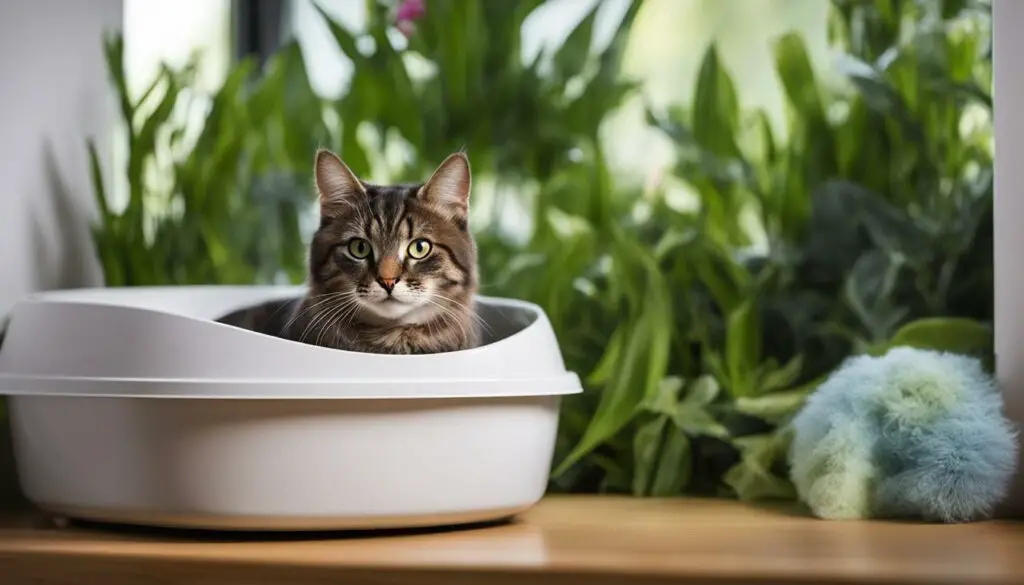
| Veterinary Care Benefits | Importance |
|---|---|
| Early Detection | Identify urinary issues before they escalate |
| Diagnostic Testing | Pinpoint the underlying cause of frequent litter box visits |
| Tailored Treatment | Receive personalized treatment plans for your cat’s specific needs |
| Preventive Care | Get advice on promoting good urinary health through nutrition and stress management |
| Long-Term Monitoring | Ensure ongoing evaluation of your cat’s urinary system for optimal health |
Common Causes of Frequent Litter Box Visits in Female Cats
Frequent litter box visits in female cats can be indicative of underlying urinary issues. While these issues may not be as commonly associated with urethral blockages as in male cats, other conditions like feline idiopathic cystitis and urinary tract infections can still cause frequent urination. It is essential to pay attention to your female cat’s litter box habits and look out for any other concerning symptoms that may accompany this behavior.
Female cats may also experience stomach ailments that can result in spending longer periods in the litter box. Factors such as digestive issues or an upset stomach can lead to increased time spent in the litter box. If your female cat consistently displays abnormal litter box habits or exhibits other worrisome symptoms, it is advisable to consult a veterinarian for a proper assessment and diagnosis.
Proper litter box training and regular cleaning can help establish and maintain good litter box habits in female cats. Ensuring that the litter box is easily accessible, providing privacy, and using litter that your cat prefers can help promote healthy elimination habits. Additionally, maintaining a stress-free environment and addressing any potential sources of stress can also contribute to maintaining good urinary health in female cats.
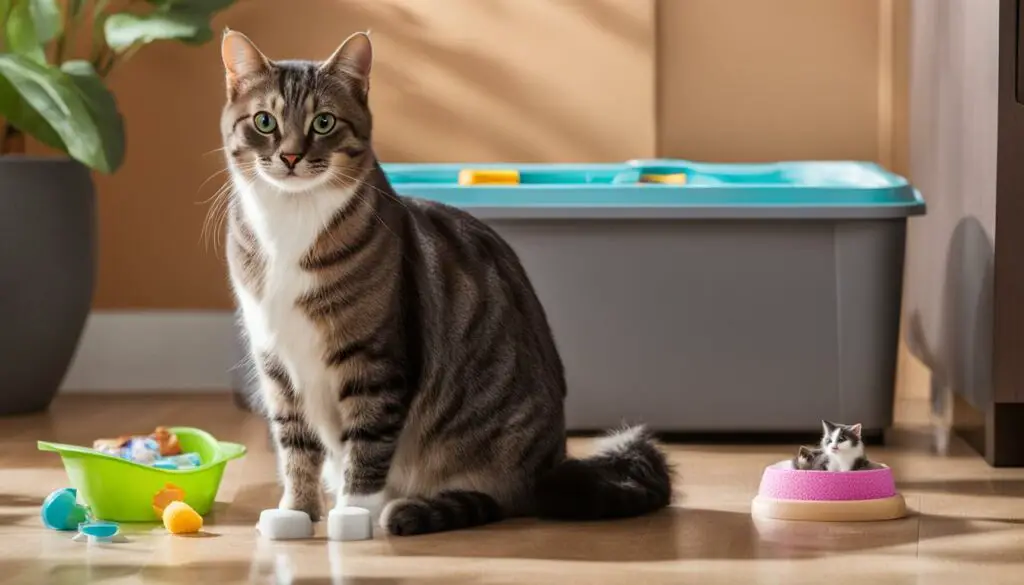
| Common Causes | Severity | Treatment |
|---|---|---|
| Feline Idiopathic Cystitis | Mild to Severe | Stress reduction techniques, medication |
| Urinary Tract Infections | Mild to Moderate | Antibiotics, pain relief |
| Stomach Ailments | Mild to Moderate | Dietary adjustments, medication |
Signs of Urinary Issues in Female Cats
- Frequent urination
- Straining or discomfort while urinating
- Blood in the urine
- Inappropriate urination outside of the litter box
- Excessive licking of the genital area
In cases of frequent litter box visits in female cats, it is important to consult a veterinarian for a proper evaluation and to rule out any underlying medical conditions. With timely intervention and appropriate treatment, most urinary issues in female cats can be effectively managed, leading to improved urinary health and overall well-being.
Behavioral Reasons for Female Cat Litter Box Habits
Understanding the litter box habits of female cats is essential for maintaining their health and ensuring their well-being. While frequent and consistent use of the litter box is generally a positive sign, there are several behavioral reasons why female cats may exhibit specific litter box habits. By recognizing these behaviors and providing appropriate training and care, you can help your female cat establish and maintain good litter box habits.
1. Stress or Anxiety
Stress and anxiety can contribute to changes in a female cat’s litter box habits. Cats are sensitive animals, and any disruptions or changes in their environment, such as the introduction of a new pet or a move to a new home, can cause them to feel stressed or anxious. This can lead to avoiding or improperly using the litter box.
To help reduce stress, it’s important to provide a calm and secure environment for your female cat. This can be achieved by creating a designated space for her with hiding spots and vertical spaces where she can feel safe. Additionally, using pheromone products like Feliway can help create a soothing environment and reduce stress-related litter box issues.
2. Privacy Preferences
Female cats may have specific preferences when it comes to privacy while using the litter box. Some cats may prefer a covered litter box, while others may prefer an open one. Understanding your cat’s preferences and providing the appropriate litter box setup can help encourage regular and proper use.
It’s also important to ensure that the litter box is placed in a quiet and secluded area of the house. This allows your female cat to feel safe and secure while using the litter box, minimizing any potential disruptions that may discourage her from using it.
3. Adjusting to New Surroundings
When a female cat is introduced to a new environment, such as a new home or a temporary lodging, she may take some time to adjust. During this adjustment period, she may display changes in her litter box habits. This can include using the litter box more frequently, using it for longer periods of time, or even refusing to use it altogether.
To help your cat adjust to new surroundings, create a quiet and comfortable space for her with familiar items like blankets or toys. Gradually introducing her to the new environment and providing plenty of positive reinforcement can help reduce any litter box issues caused by the adjustment period.
By understanding and addressing these behavioral reasons for female cat litter box habits, you can ensure that your cat maintains good litter box habits and enjoys a healthy and stress-free life.
Understanding Normal Litter Box Habits in Kittens
Kittens, like human babies, need time to develop their skills and behaviors. When it comes to litter box habits, it’s important to understand that kittens may take some time to learn and adapt. Their behavior in the litter box may differ from that of adult cats. It’s crucial to be patient and provide them with a supportive environment to foster proper elimination habits.
During the early stages of kittenhood, it’s normal for them to spend more time in the litter box. They may take longer to dig, cover their waste, or explore their surroundings. This is their way of learning and familiarizing themselves with the litter box. As kittens grow and develop, they will gradually improve their litter box habits and become more efficient in using it.
To aid in the litter box training process, consider these tips:
- Provide a small litter box with low sides that kittens can easily access.
- Place the litter box in a quiet and easily accessible location.
- Use a litter that is safe and comfortable for kittens to walk on.
- Clean the litter box regularly to remove any waste or odor.
- Monitor your kitten’s behavior and praise them when they use the litter box correctly.
Remember, every kitten is unique, and they may progress at different rates. Some kittens may take a little longer to master litter box habits than others. If you have any concerns or notice any unusual behavior, consult your veterinarian for guidance and support.
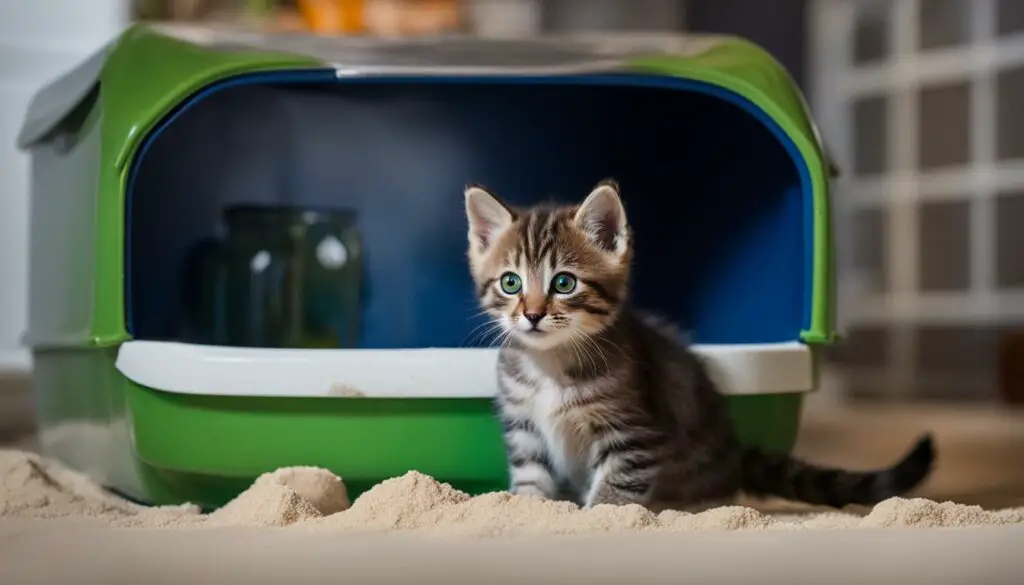
Table: Comparison of Litter Box Habits Between Kittens and Adult Cats
| Kittens | Adult Cats | |
|---|---|---|
| Litter Box Usage | May spend more time exploring, digging, and playing in the litter box. | Visit the litter box primarily for elimination purposes. |
| Efficiency | May take longer to cover waste or find the ideal spot in the litter box. | Efficiently cover waste and choose a preferred spot in the litter box. |
| Litter Box Training | Require consistent training and reinforcement of proper litter box habits. | Already familiar with litter box habits and may require less training. |
| Frequency | May visit the litter box more frequently due to a smaller bladder capacity. | Visit the litter box based on their individual elimination needs. |
Conclusion: Understanding Why Your Male Cat is Visiting the Litter Box So Often
As a cat owner, it’s important to understand why your male cat is visiting the litter box frequently. This behavior could indicate underlying urinary issues that need attention. Whether it’s caused by medical factors like feline lower urinary tract disease or psychological factors like stress, it’s crucial to address the issue to ensure your cat’s health and well-being.
Regular veterinary check-ups are essential for monitoring your male cat’s overall health and addressing any urinary issues. Your veterinarian can provide proper diagnosis, examinations, and treatment plans tailored to your cat’s needs. They can also offer valuable advice on preventive care, proper nutrition, and stress management techniques.
In addition to veterinary care, ensuring proper litter box maintenance and litter box training is crucial. Scooping the litter box daily and providing enough litter boxes for your cat can help prevent litter box aversion and keep the litter box clean. Creating a calm and stable environment for your cat, using stress reduction techniques like environmental enrichment and pheromone therapy, can also help reduce stress-related urinary issues.
Lastly, diet plays a significant role in maintaining male cat health, particularly regarding urinary issues. Feeding a high-quality cat food formulated to support urinary health and ensuring your cat stays hydrated can promote a healthy urinary system.
Remember, if you have concerns about your male cat’s frequent litter box visits, it’s important to seek professional advice. By understanding the underlying causes and taking proactive steps to manage and prevent urinary issues, you can help your male cat lead a happier and healthier life.
FAQ
What are the medical causes of frequent litter box visits in male cats?
Frequent litter box visits in male cats can be caused by medical conditions such as feline lower urinary tract disease, bladder stones, urethral blockages, urinary tract cancer, or urinary tract infections.
What are the psychological causes of frequent litter box visits in male cats?
Psychological factors like stress, changes in the environment, or the presence of other cats can contribute to frequent litter box visits in male cats.
What signs should I look out for in male cats with frequent litter box visits?
Signs to watch for include blood in the urine, straining to urinate, urinating in unusual places, excessive grooming of the genital area, and discolored urine.
When should I seek veterinary attention for my male cat’s frequent litter box visits?
If your male cat is repeatedly going to the litter box without passing urine, showing signs of pain, or has bloody or abnormal-smelling urine, it is important to seek immediate veterinary attention.
What are the treatment options for male cats with urinary issues?
Treatment for male cats with urinary issues depends on the underlying cause and may include stress reduction techniques, medication, or medical procedures/surgery.
How can I maintain proper litter box hygiene and prevent urinary issues in my male cat?
Proper litter box maintenance, including daily scooping and providing enough litter boxes, is important. Litter box training, monitoring behavior, and creating a stress-free environment can also help prevent urinary issues.
What role does diet play in maintaining male cat health and preventing urinary issues?
Feeding a high-quality cat food formulated to support urinary health and ensuring your cat stays hydrated can help prevent bladder stones and reduce the risk of urinary tract infections.
How can I reduce stress in my male cat to promote better urinary health?
Creating a calm and stable environment, providing hiding places and vertical spaces, and using pheromone products like Feliway can help reduce stress in cats and promote better urinary health.
How important is regular veterinary care for male cat health and urinary issues?
Regular veterinary check-ups are crucial for monitoring overall health, diagnosing urinary issues, and receiving appropriate treatment plans for male cats experiencing frequent litter box visits.
What are the common causes of frequent litter box visits in female cats?
Female cats can experience urinary issues like feline idiopathic cystitis and urinary tract infections, but they are less likely to have urethral blockages.
What are the behavioral reasons for female cat litter box habits?
Female cats may exhibit litter box behaviors due to stress, seeking privacy, or adjusting to new surroundings. Proper litter box training and regular cleaning can help maintain good habits.
What are the normal litter box habits in kittens?
Kittens may spend more time in the litter box as they learn proper elimination habits. As long as there are no signs of distress or abnormal stools, this behavior should improve as they grow.

